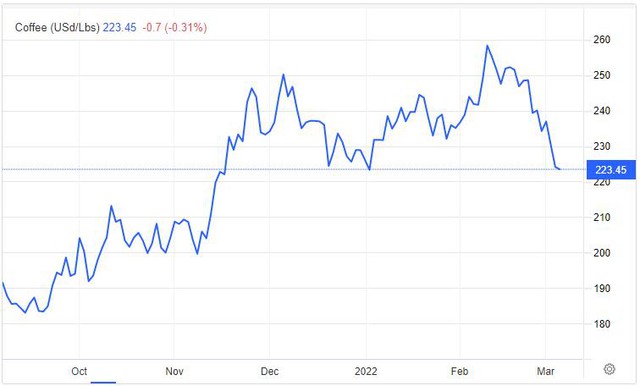Traders in Brazil, the world’s largest coffee exporter and No. 1 coffee supplier to Russia, say they’ve added the country to a list of risky destinations and forced pre-delivery payments. row. The list previously included Syria, Lebanon and Iran.
Three coffee traders from a major European commodity trade center told Reuters they will not be taking any new supply orders with Russian roasters. Further business activity was in any case slowed down by the plunge of the Russian ruble.
Coffee broker Thomas Raad, whose business is in the business of regularly shipping goods to risky destinations, said: “There’s too much uncertainty about their solvency, so the deals are very volatile. New translation can only be done with 100% prepayment.
Jose Marcos Magalhaes, the head of the Minasul International Coffee Alliance, said prepayment will be required for any new orders to Russia, even though Russia is a regular customer. He said his Union would also need insurance related to shipping, as container shipping lines are restricting deliveries to Russia since Russia carried out “Special Operation” in Ukraine. .
Broker Thomas Raad said he is in talks with a Russian buyer who has submitted samples of the coffee for approval, but has yet to discuss payment.
SWIFT, the international banking messaging system used to transfer money, said on March 1 it was waiting for instructions on which Russian banks should be disconnected from the system under sanctions.
Brazilian exporters association Cecafe said changes to SWIFT could certainly affect transactions, but the situation was not yet clear. According to Cecafe, Russia bought 1.2 million bags of Brazilian coffee in 2021, worth $177 million.
Mr. Thomas Raad thinks that cryptocurrencies can be an option for payment. “I would use crypto because I am familiar with it, but many exporters are not,” said Mr. Raad.
According to Mr. Raad, for that to work, the Russian importer will need access to a cryptocurrency broker to be able to more easily complete both stages of payment using USD Coin, a digital currency pegged to the US dollar.
Brazil’s green coffee exports in February 2022 reached 208,511 tons, higher than 191,099 tons in the same period last year.
Russia is also a large coffee export market for Vietnam because the coffee that Russian consumers prefer is instant coffee. Currently, in the instant coffee segment, Russia ranks third in the world after the US and UK in terms of per capita consumption. The instant coffee segment has almost reached its saturation point. In the past few years, the consumption rate of instant coffee and roasted coffee (powder and beans) is gradually changing in the direction of increasing consumption of roasted coffee. Coffee is not grown in Russia, so the domestic market depends on the development trend of the world market: as prices increase, supply decreases due to climatic conditions and other factors.
In 2021, while the country’s coffee exports decreased slightly by 0.2% in volume, exports to Russia still increased.
Accordingly, Vietnam’s coffee exports to Russia last year reached 81,818 tons, with a turnover of 173.2 million USD, a sharp increase of 18.27% in volume and 25.32% in turnover compared to the previous year. accounting for more than 5% of total coffee exports, making Russia the 6th largest export market for this item of our country.
Notably, in January 2022, Russia’s share in Vietnam’s total coffee exports continued to increase to more than 6%, reaching 10,575 tons, with a turnover of 24.5 million USD, up 26.12% and 14 years respectively. ,69% compared to the previous month, and strongly increased 45.32% and 79.88% over the same period last year.
Vietnam’s coffee exports to markets in February are estimated at 130,000 tons, worth US$304 million, bringing the total exports in the first two months of this year to 4.8 million bags (1 bag = 60 kg), with an estimated turnover of 674 million USD, up 35.6% compared to the same period last year.
As for Russia, coffee imports have tended to increase over the years, and Vietnam is one of Russia’s largest suppliers, currently accounting for about 35% of total coffee imports into this market.
With the situation of exporting to Russia facing difficulties in both payment and supply chain disruption, world coffee prices tend to decrease rapidly.
The price of arabica on the ICE floor on March 4 touched a 3.5-month low of $2,2165/lb, while robusta on March 3 touched a 6-month low of $2,013/ton, for the whole week. down more than 7%.

Robusta coffee price lowest within 3.5 months.
Traders of this commodity are concerned that any global economic slowdown related to the Ukraine crisis could limit demand, in addition to worries that sales to Russian customers have may slow down due to sanctions.
The downward trend in world prices began to affect domestic prices. Bucket green coffee in the Central Highlands this week is sold at 38,900-41,000 VND ($1.70-1.80) per kg, down from 40,600-41,800 VND last week. Meanwhile, Robusta coffee grade 2 (5% black & broken) has a discount of 325 USD/ton compared to the July term on the London floor, compared with the deduction of 330 – 340 USD of the previous week.
Domestic coffee businesses are also wondering if they can transport coffee to Russia? How do I deliver and pay for the goods? Meanwhile, freight rates are rising again.
References: Reuters, Barchart
